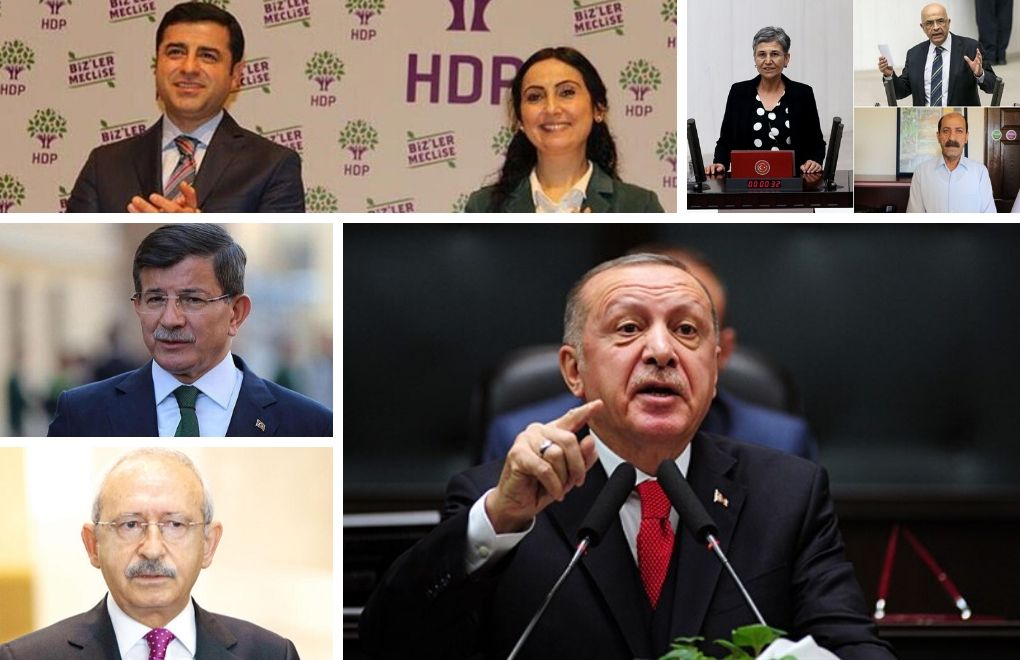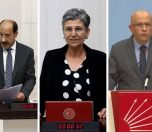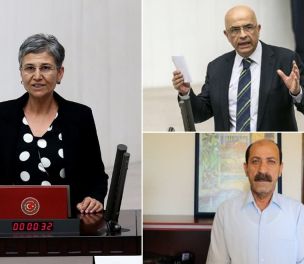Click to read the article in Turkish
Three opposition lawmakers were stripped of MP status and arrested on June 4, after the deputy parliamentary speaker read out final court rulings against them.
While Enis Berberoğlu from the main opposition Republican People's Party (CHP) was released one day later as his sentence was postponed until July 31 due to coronavirus measures at prisons, two MPs from the Peoples' Democratic Party (HDP), Leyla Güven and Musa Farisoğlulları, are behind bars to serve their sentences.
President and Justice and Development Party (AKP) Chair Recep Tayyip Erdoğan on January 2, 2016, claimed that Selahattin Demirtaş and Figen Yüksekdağ, the co-chairs of the HDP at the time, committed constitutional crimes and said, "A process that begins with the lift of their immunity will make a positive impact to the atmosphere in our country in terms of fighting terrorism."
Since then, 13 MPs from the HDP and one from the CHP have been dismissed as lawmakers and eight MPs have been remanded in custody, including former MPs.
How did the process begin?
On December 27, 2015, the Democratic Society Congress held an extraordinary meeting due to the "trench warfare," curfews, operations, civilian deaths and the conflict in several Kurdish-majority provinces in the southeast. Releasing a 14-article declaration, it suggested the establishment of "democratic autonomous regions," which it said was "adopted" by the Kurdish people.
After Demirtaş and Yüksekdağ supported the declaration, Erdoğan called for the lift of legislative immunity for the first time.
Three months later, on April 7, the AKP announced that it opened a draft amendment regarding legislative immunity to the signature.
After Ahmet Davutoğlu, the then prime minister, said at the AKP group meeting on April 12 that "We will submit [the law proposal] to the parliament today or tomorrow," the proposal was submitted to the parliament on the same day.
What did the proposal include?
* Within 15 days after the law enters into force, the investigation reports [against MPs] will be sent to the courts and the MPs will only be allowed to be tried in these cases.
* Because their immunity is not removed in a way other than what was stipulated by the Constitution and the internal regulation but with a temporary article added to the Constitution outside the current procedures and provisions, Parliamentarians will not be able to exercise their right for cancellation.
* Because the 1st sentence of the 2nd paragraph of Article 83 of the Constitution, which says parliamentarians cannot be arrested, will not be applied, parliamentarians whose immunity is lifted can be investigated and arrested without a decision of the parliament.
CHP: It's against the Constitution, but we'll say 'yes'
During a TV program on CNN Türk on April 13, Kemal Kılıçdaroğlu, the chair of the main opposition Republican People's Party (CHP), said that they would say 'yes' to the proposed amendment to the Constitution.
"A regulation that is against the Constitution and aimed at deceiving the public is coming. If they are going to send us to jail after the immunity is lifted, let them do it. To bring real democracy to this country, we are ready to pay a price. We must make a serious decision and risk everything. The HDP should also say, 'yes'," Kılıçdaroğlu remarked.
Investigations against 138 MPs
The voting of the proposal was held at the general assembly of the parliament on May 12. The first article passed with 373 votes and the second article passed with 374 votes. The whole proposal passed with 376 votes while there 140 votes against the proposal and five absentation votes, seven invalid votes and three blank votes in the 550-seat parliament.
There were summaries of proceedings against 138 MPs at the time, with 27 of them being from the AKP, 51 from the CHP, 50 from the HDP, 9 from the MHP, along with one independent MP.
There were a total of 138 investigation files regarding the MPs. Forty-six of them were against AKP MPs, 192 were against CHP MPs, 405 were against HDP MPs, 20 were against MHP MPs and five were against independent MP Aylin Nazlıaka.
Then Justice Minister Bekir Bozdağ announced the following figures about the summaries of proceedings regarding legislative immunity:
"216 for terrorism offenses, 201 for insult crimes, 11 for injury crimes, 38 for duty crimes, 6 for forgery crimes, 18 for threat crimes, 11 for crimes related to privacy violation, 55 for praising crime and criminals, 24 for provocating people into hatred and enmity, 119 for opposition to the Law No. 2911 on Meetings and Demonstrations, 11 for violating the Election Law no. 298, 3 for violating the Law on Political Parties no. 2820, 13 for slander, 1 for violating the Law on Associations No. 5253., 1 for discouraging people from military service and one for damage to property."
Kılıçdaroğlu: The target was CHP
On June 8, 2016, the law came into force after the approval of Erdoğan. One year ago, the HDP received 12,96 percent votes and won 79 seats in the parliament.
On June 24, CHP Chair Kılıçdaroğlu told the Habertürk newspaper that voting "yes" was contradictory for them.
"We do politics. If Turkey had a referendum regarding the immunity, it would be divided. Who would be responsible for this? It would be the CHP. we would have laid ground for division because we cast a dissenting vote. The real target was not the HDP, it was the CHP," he said.
Raids in HDP MPs houses
On November 4, the police raided the houses of 12 HDP MPs. Nine of them, including the co-chairs, were remanded in custody. Three were released on the condition of judicial control. MP Nihat Akdoğan was remanded in custody on November 7.
Imprisoned former and current MPs of the HDP Abdullah Zeydan, Selahattin Demirtaş, Figen Yüksekdağ, Çağlar Demirel, idris Baluken, Sebahat Tuncel, Musa Farisoğulları, Leyla Güven.
On June 14, 2017, CHP MP Enis Berberoğlu was sentenced to 5 years and 10 months in prison in the "MİT trucks" case. After being remanded in custody, Berberoğlu was elected an MP in the June 2018 general elections and released on September 20, 2018.
HDP's Musa Farisoğlulları was sentenced to 9 years in prison and Leyla Güven was sentenced to 6 years and 3 months in prison by Diyarbakır 2nd Heavy Penal Court for "membership of an armed terrorist organization." The Court of Cassation upheld both MPs' sentences. Güven was sent to Diyarbakır Women's Closed Prison and Farisoğlulları was sent to Diyarbakır Type-D Closed Prison. (TP/VK)







scs.jpg)


.jpg)
.jpg)


